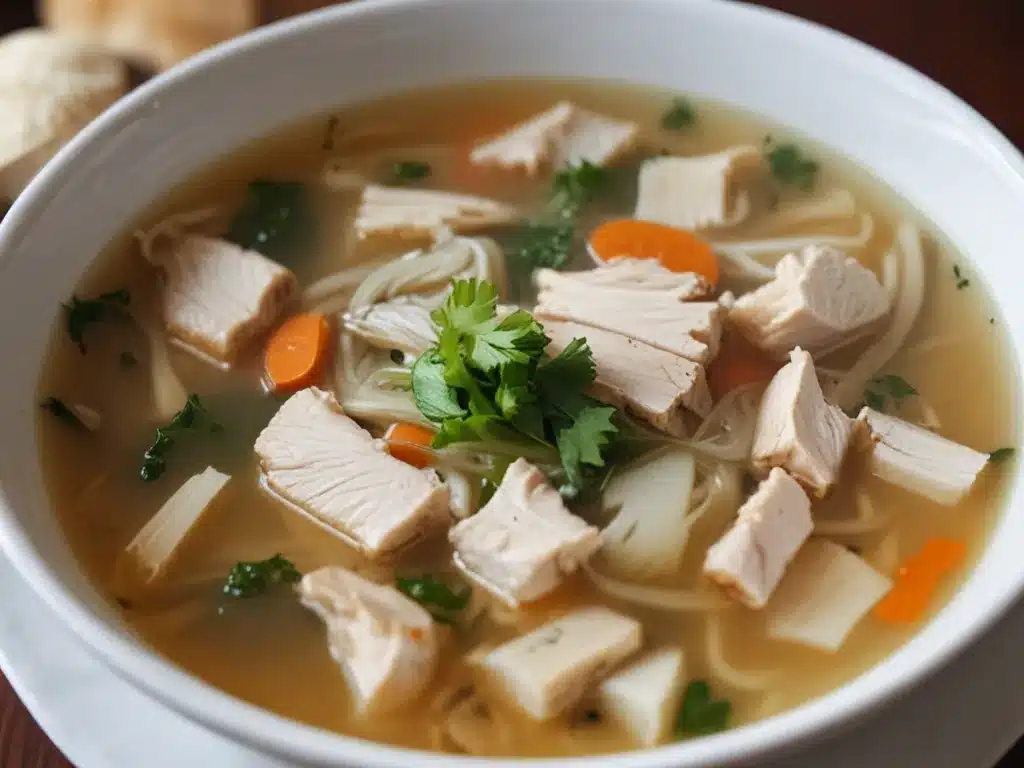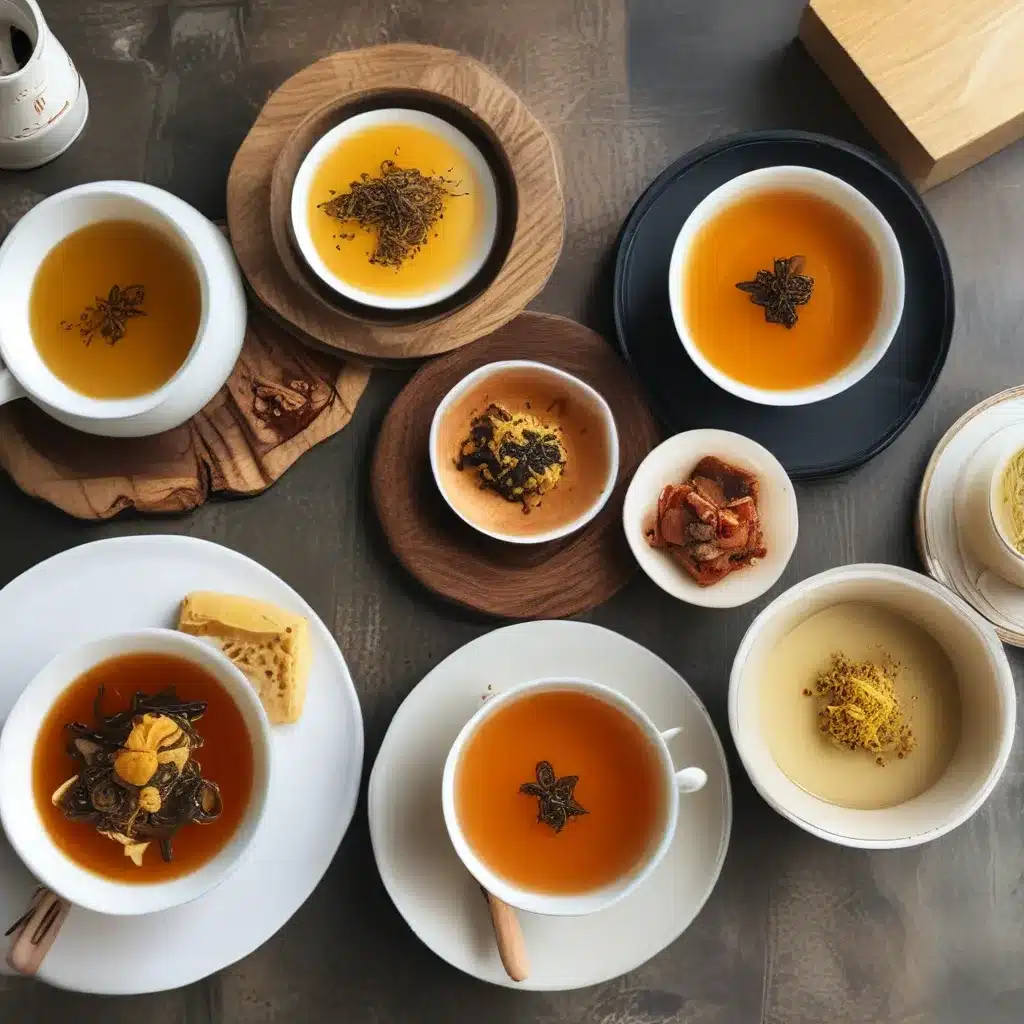
What is Chinese Chicken Soup?
As a lifelong resident of China, I have heard since childhood that Chinese chicken soup is the best remedy when feeling unwell with a cold or flu. Chinese chicken soup, also known as Jinqian Ji, is a traditional Chinese medicinal soup made by simmering chicken, various Chinese herbs and spices in water. The main ingredients include chicken, ginger, dates, white fungus and green onions.
Some key herbs and ingredients commonly added to Chinese chicken soup include:
- Chicken: Provides protein and nutrients to aid recovery.
- Ginger: Known for its antiviral and anti-inflammatory properties, ginger helps relieve symptoms like coughs and congestion.
- Astragalus: This herb boosts the immune system and fights off viruses and bacteria.
- Dates: Rich in vitamins and minerals, dates have expectorant qualities to loosen mucus in the lungs and throat.
- White fungus (Tremella): A medicinal mushroom prized for its antioxidant effects and ability to ease respiratory issues.
- Green onions: Mild antibiotic compounds help reduce fever and clear congestion.
Cooking all these nourishing ingredients together in a broth concentrates their immune-boosting and healing compounds. The warm soup is soothing and easy for the body to digest when under the weather.
How does Chinese Chicken Soup help with Colds and Flu?
There are several reasons why Chinese chicken soup is believed to be an effective remedy for common colds and flu:
- The mix of proteins, vitamins, minerals and complex carbohydrates in the soup provides nutrients to support the immune system fighting off viruses. Chicken is a good source of high-quality protein, while vegetables and herbs add vitamins and minerals.
- Antiviral and anti-inflammatory herbs like ginger and astragalus actively work to reduce symptoms and shorten the duration of illness. Ginger especially helps reduce fever and muscle aches associated with influenza.
- Moisturizing ingredients such as dates and chicken broth soothe irritation in the throat and lungs from excessive coughing. The warming soup also induces sweating, which can help lower a fever.
- Drinking warm, nutritious chicken soup encourages fluid intake which is important for staying hydrated during illness. Dehydration exacerbates symptoms and slows recovery. Staying hydrated helps flush toxins from the body.
The blend of ingredients in this traditional medicine works together synergistically to nourish, strengthen immunity, relieve symptoms and aid recovery from colds or flu. Clinical studies on individual herbs and ingredients have validated their antiviral and antimicrobial properties.
Does Clinical Research Support its Effectiveness?
While Chinese chicken soup has long been relied on in folk medicine as a remedy for common illnesses, some clinical studies have also provided evidence to support its effectiveness:
A 2007 study from the University of Nebraska Medical Center found that chicken soup truly does have anti-inflammatory properties. Researchers reported that chicken soup inhibits neutrophil migration, reducing their ability to cause inflammation in the mucus membrane lining of the lungs. This action likely helps to relieve symptoms of congestion.
Another study in 2012 from the University of Miami School of Medicine tested a commercially prepared chicken soup on respiratory illnesses. Volunteers who consumed the soup reported significant reductions in symptom severity for runny nose, sore throat and cough compared to a placebo group. Researchers felt these beneficial effects were likely due to the synergistic interaction between ingredients rather than any single component.
In 2018, a meta-analysis published in the journal Nutrients analyzed results of multiple studies on herbs commonly found in chicken soup and their impact on respiratory illnesses. Significant evidence was found that ingredients such as ginger, garlic and onions have antioxidant, antiviral, expectorant and decongestant properties beneficial for reducing cold symptoms and shortening their duration.
While not definitive, the research so far gives scientific credibility to traditional beliefs in chicken soup’s efficacy. The mix of nutrients and herbal medicine in this tasty remedy may indeed be a simple yet powerful treatment for common respiratory infections. As the old saying goes: “Nothing works like chicken soup for a cold or flu!”
Comparing Chinese Chicken Soup to Western Soup
| Chinese Chicken Soup | Western Chicken Soup |
|---|---|
| Uses medicinal Chinese herbs like astragalus, dates, white fungus to boost immunity and target symptoms | Often lacks anti-viral/immune-boosting herbs, focusing more on simple nourishment |
| Ingredients carefully chosen and simmered to extract maximum immune and healing agents | Focus is often on taste rather than traditional medicinal principles behind each element |
| Recipe and preparation follow principles of traditional Chinese medicine to create balancing and synergistic effects | Not necessarily focused on tailoring ingredients to Chinese medical theories |
While both Chinese and Western chicken soups aim to comfort and nourish those feeling ill, traditional Chinese chicken soup has the added advantages of centuries of herbal wisdom. By including targeted herbs to enhance immunity, reduce inflammation, relieve congestion and fight off pathogens, it becomes more than just a source of nutrients. For dealing specifically with colds and influenza, Chinese chicken soup with its medicinal approach may offer more potent recovery support. However, any type of chicken soup is always better than no soup when under the weather!
Can I Make my Own Chinese Chicken Soup?
Absolutely, you can easily make your own homemade Chinese chicken soup using basic pantry ingredients. Here is a simple recipe I like to follow when I’m feeling sick:
Ingredients:
- 1 whole chicken or chicken pieces (I use bone-in parts for maximum nutrition)
- 6 cups water
- 1 inch piece fresh ginger, sliced
- 5 dried shiitake mushrooms
- 3 green onions, chopped
- 4 dried woody Chinese dates, pitted and halved
- 1/4 cup dried white fungus (rehydrate before using)
- Salt to taste
Instructions:
-
Place chicken and water in a large pot and bring to a boil over high heat. Skim off foam, reduce heat and simmer for 30 minutes.
-
Add ginger, shiitake mushrooms, dates and white fungus. Continue simmering for 1 hour, skimming as needed.
-
Remove chicken from broth, let cool and shred or dice meat. Return chicken to broth.
-
Add green onions and season with salt to taste. Heat through and serve hot. Enjoy this comforting, healing soup!
Homemade soup allows me to control ingredients for maximum benefit. I find it very soothing when under the weather. Stored leftovers also make easy meals throughout my illness.
Reader Question: Does the Soup Work for all Illnesses?
That’s a great question. While Chinese chicken soup seems to be most effective for resolving colds and flu-like illnesses involving congestion and upper respiratory tract symptoms, some people also claim it helps with other issues:
- sore throats caused by colds or allergies
- sinus infections
- bronchitis
- mild stomach upset
- general malaise or fatigue
However, chicken soup alone is likely not a cure-all and should always be used in conjunction with other medical advice and treatment as needed for:
- viral or bacterial infections beyond mild scope
- immune disorders
- serious or long-term illnesses
- intestinal issues besides minor indigestion
For anything requiring prescription medication, one would continue other treatment instead of relying solely on soup. But as an easy home remedy, chicken soup appears quite safe and may have synergistic benefits when combined with traditional medicine under a doctor’s guidance. Overall, this nourishing comfort food is a logical choice for many common minor illnesses.






